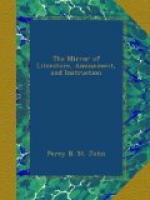He again quitted Ferrara, on an appointment “by Alphonso, but again soon returned:—
“On his return he established himself, with his two unmarried sisters, in the house he had built near the church of Saint Benedict, and resumed his former occupations. Of his lighter amusements, gardening was that in which he took most pleasure; and it is curious to know that he was as fond of altering the plan of both his house and grounds, as he was of remodelling the stanzas of the Orlando. His son, Virginio proposed writing an account of his illustrious father’s life; but unfortunately, he never pursued his design beyond the commencement, and a few memorandums are all that have come down to us. From these, however, we learn the singular fastidiousness of Ariosto in his horticultural amusements, and some other traits of his character, which render him not the less an object of our veneration, by showing us the simplicity as well as power of his mind. ‘In gardening,’ says Virginio, ’he pursued the same plan as with his verses, never leaving any thing he had planted more than three months in the same place: and, if he set a fruit-tree, or sowed seed of any kind, he would go so often to examine it, and see if it were growing, that he generally ended with spoiling or breaking off the bud.’
“We learn, from the same interesting document, that he had at first no intention of building a house for constant residence in this garden, but that, having raised a mere cottage for temporary shelter, he grew so fond of the spot, that he wished never to leave it. The structure, after all, was not fully suited to his taste, and he felt as great an inclination to improve it by continual alterations as his garden. His constant lamentation was, that he could not change the arrangement of his house as he could that of his verses: and a person having asked him one day, how it happened that he who could describe castles and palaces so magnificently, had built such a cottage, he replied, that he made his verses without the aid of money.
“In his favourite garden he passed many hours of the day, deriving new inspiration from its green and refreshing solitudes. The Orlando was still in progress, and still under correction, his confidence in himself, it seems, having been little increased either by years or practice. In speaking, however, on this subject, he was accustomed to say, that poetry might be compared to a laurel, which sprung up of itself, and which might be greatly improved by cultivation, but would lose all its natural beauty if too much meddled with:—this is the case, he would continue, with stanzas, which come into the mind, we know not how, and which may be improved by the correction of a little original roughness, but are deprived of all their grace and freshness by too nice a handling.”—(Stebbing’s Life.)




